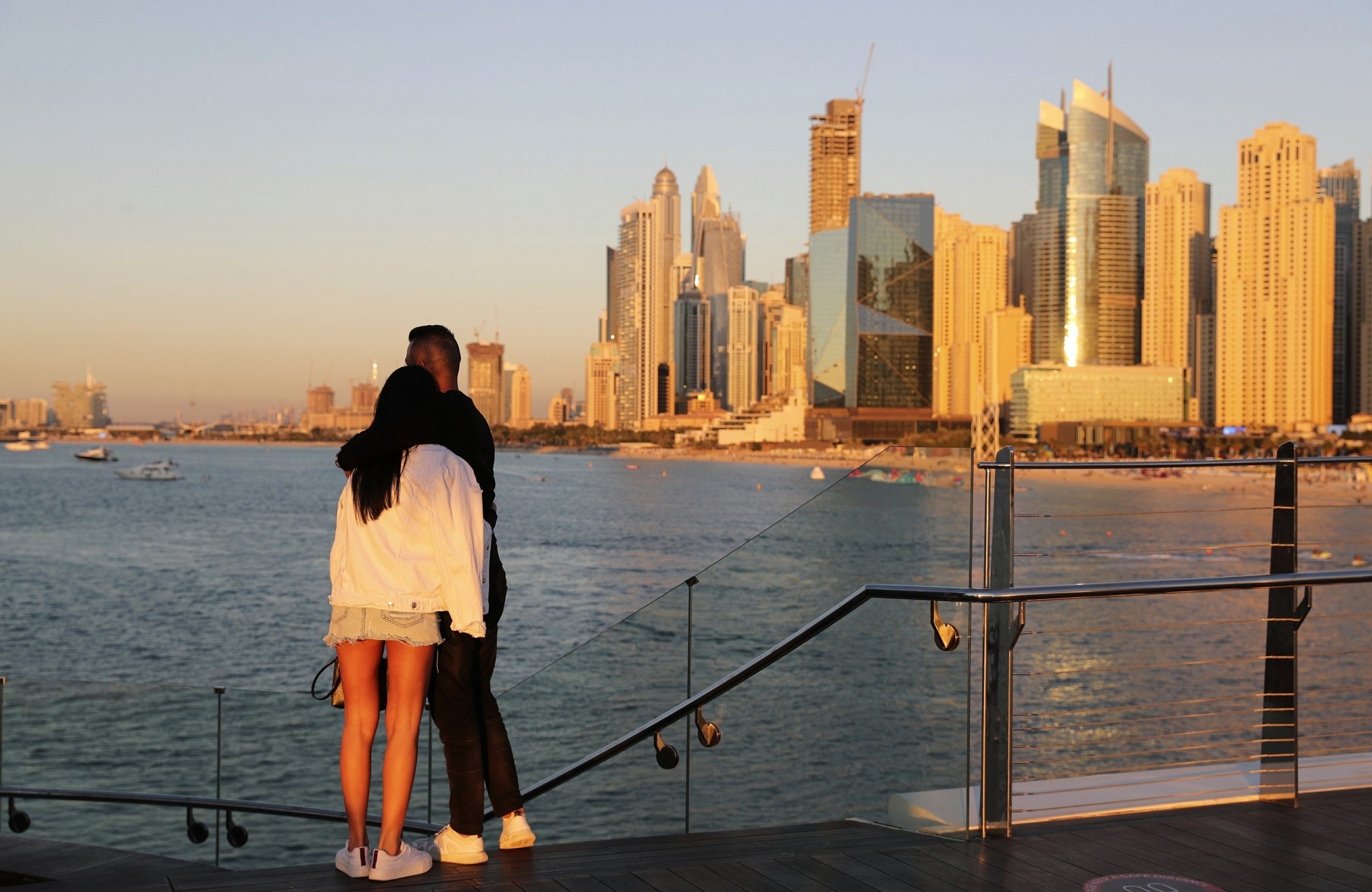
Dubai, United Arab Emirates (AP) – Masks as soon as you get inside. Bars as full and pulsating as 2019. Social media stars wave bottles of champagne. DJs spin party tunes through brunch for several hours
Since it became one of the first destinations in the world to open up to tourism, Dubai, in the United Arab Emirates, has promoted itself as the ideal place to spend epidemics. Analysts say it cannot afford other costs, as the virus shakes the foundations of the city’s economy.
With cavernous shopping centers, frantic construction and hordes of foreign workers, Dubai is built on the promise of globalization, Relying heavily on the aviation, hospitality and retail sectors – all hit hard by the virus.
Now reality is catching up with the emirate with big dreams. With the peak tourism season in full swing, coronavirus infections have soared to unprecedented levels. The number of daily cases has nearly tripled in the past month, forcing Britain to close the travel corridor with Dubai last week. But in the face of the growing economic crisis, the city will not be closed.
“Dubai’s economy is a house of cards,” said Matthew Page, a nonresident scholar at the Carnegie Endowment for International Peace. “Its competitive advantage is that it is a place where the rules do not apply.”
While most countries have banned entry to tourists from the United Kingdom due to fears of the rapidly spreading virus present there, Dubai, home to some 240,000 British expatriates, has kept its doors open for holidays. Emirates Airlines operates five daily flights to London’s Heathrow Airport.
Within days, the new virus strain arrived in the UAE, but that hasn’t stopped reality TV and soccer stars from fleeing Britain’s shutdown and winter weather for Dubai’s bars and beaches – without taking a coronavirus test before boarding the plane. Scenes of celebrations preceding the pandemic were scattered across British newspapers. In the face of backlash, Instagram influencers seen at wild yacht parties were quick to declare their travel “must-have”.
Dubai was happy to pour in. Hotel occupancy rates rose to 71% in December, according to data provider STR. Airlines between London and Dubai were ranked the busiest in the world during the first week of January, according to flight data analysis company OAG.
“People are really tired of this epidemic,” said Iris Sabilano from the Arab Travel Agency in Dubai, adding that many of her clients were forced to quarantine after testing positive for the virus upon arrival or before departure. Passengers coming from a select list of countries do not need to undergo tests prior to their flights but must all be at Dubai Airport.
“With the advent of vaccines, they feel it is not the end of the world, and they will not die,” she said.
For those who die from COVID-19, Emirates is offering to pay $ 1,800 to help cover funeral costs.
As the outbreak worsens, the stampede appears to be slowing. The Israeli tourists, who arrived in the tens of thousands after the normalization agreement between the two countries, disappeared due to the new quarantine rules. The decision to suspend visa waivers for Israelis to the United Arab Emirates until July came into effect on Monday. Britain’s move to impose a 10-day quarantine on returnees from Dubai threatens to hit what is left of the tourism sector.
“The British make up such a significant proportion of tourists and investors in Dubai,” said David Tarch, a spokesman for ForwardKeys, a travel data analysis company. “This pipeline cut … a complete disaster for the city.”
Grant Shaps, UK Transport Secretary, said on Twitter that the government’s decision was prompted by the latest virus data in the UAE. Other than daily casualties, data is scarce. The UAE does not publish general information about disease clusters or hospitalizations.
Amid an intense testing campaign, the country has reported more than 256,000 cases and 751 deaths. Analysts speculate that the UAE’s unique demographics – 90% of expatriates, mostly young, healthy workers – have prevented well-staffed hospitals from getting crowded and kept the death rate low at 0.3%.
But that did not calm Abu Dhabi, the most conservative neighbor of Dubai and the country’s capital. Without explanation, Abu Dhabi has kept its border with Free Dubai closed, despite promises to reopen them by Christmas. Anyone crossing into Abu Dhabi must present a negative coronavirus test.
Relationships between service-rich Dubai and oil-rich Abu Dhabi could be strained. During the 2009 financial crisis, it needed Abu Dhabi to save Dubai with $ 20 billion. This time, it is unclear whether Dubai can count on another cash injection, given the collapse in global oil prices.
Even in the pre-pandemic period, Dubai’s economy was heading towards another contraction thanks to a shaky real estate market, which has fallen in value by 30% since the peak of 2014. The emirate and the network of government-linked entities are facing billions of dollars in debt repayment. The government has already stepped in to help Emirates Airlines, which received $ 2 billion in aid last year. Other debt-laden companies investing in hospitality and tourism may need help, especially with events like World Expo that have been postponed for a year. Ratings agency S&P Global estimates Dubai’s debt burden at about 148% of GDP if state-related industries are included.
Under pressure, authorities have used vaccines as the only way to contain the outbreak. On the front pages of state-linked newspapers there were stories promoting the mass vaccination campaign, which officials claim is the second-fastest vaccination campaign in the world after Israel, with 19 doses distributed for every 100 people as of Tuesday.
The United Arab Emirates offers the Chinese Corona virus vaccine Sinopharm to everyone, even if its announcement of the effectiveness of the shot lacks data and details. The demand has flooded the supply of the Pfizer-BioNTech vaccine in Dubai, with hotline operators saying that thousands of high-risk residents remain on the waiting list.
With the country shattering its record of infection for seven consecutive days, the ruler of Dubai, Sheikh Mohammed bin Rashid Al Maktoum, declared that widespread vaccination, rather than restrictions on movement, would “accelerate the full recovery of our country.”
But even if Dubai achieves its goal of vaccinating 70% of the population by the end of 2021, Moody’s Investors Service expects the UAE economy to take three years to recover.
“I don’t think the days of Dubai are numbered,” said Page, a researcher at Carnegie University. “But if the city were more humble and responsible, it would be a more sustainable place.”

“Зомбі-євангеліст. Мислитель. Завзятий творець. Інтернет-фанат, що отримує нагороди. Невиліковний фанат”.


